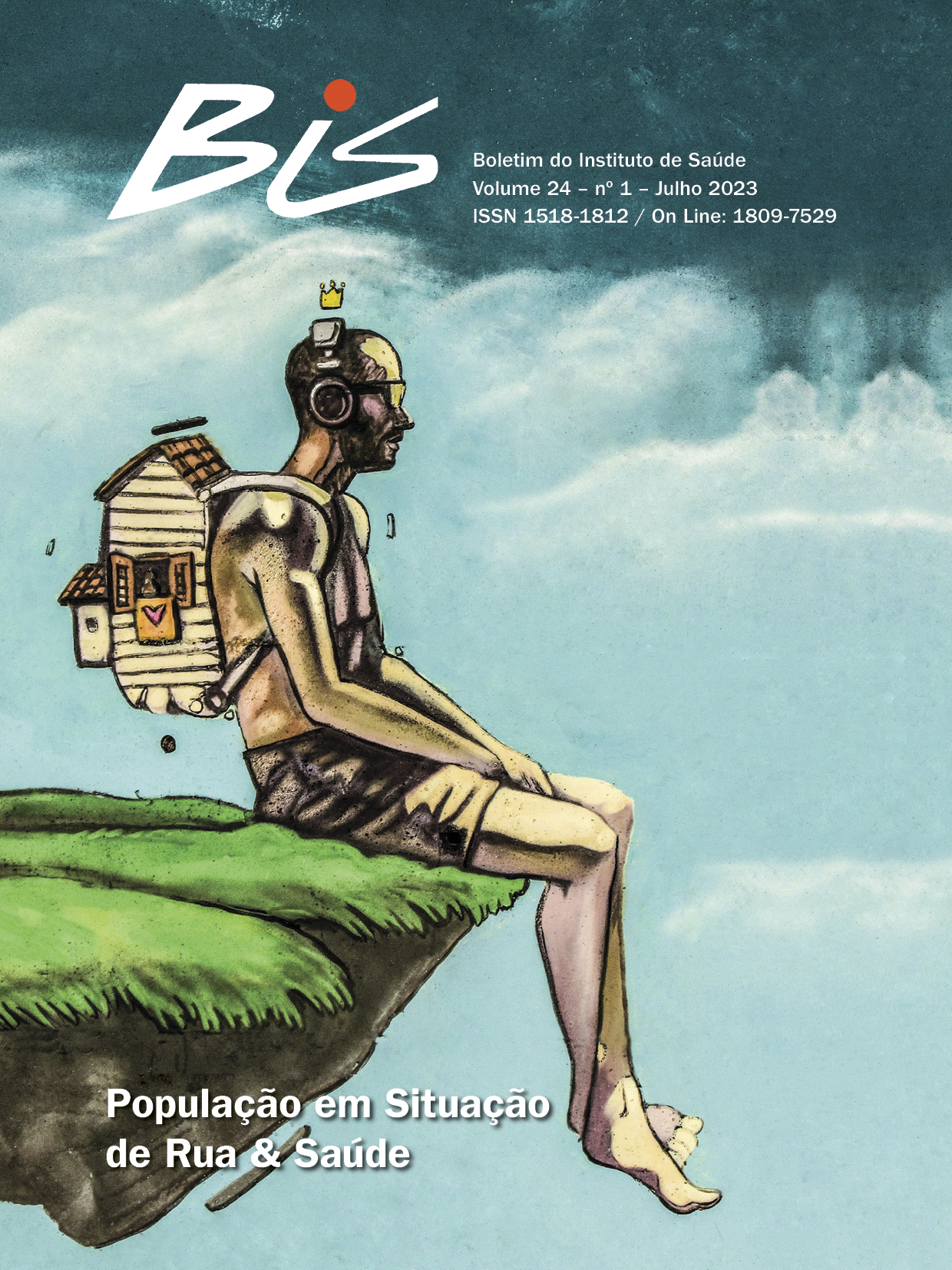Abstract
The last census of the homeless population of the city of São Paulo, in 2021, counted 31,884 people. The question of gender
identity was self-reported by 68.58%, against 31.42% of people who didn't answer. The majority, 54.91% are cisgender men and
11.58% are cisgender women. In the census, 668 people (3.05%) self-reported other identities not cisgender and represent the LGBTQIA+ universe analyzed. Considering the individual, social, and programmatic vulnerabilities of LGBTQIA+ people, we examine,
from an intersectional perspective, the profile of this population, regarding the characterization of the street situation, the time they
have been living on the streets, the age group, the specificities of their gender identity and race/color/ethnicity, as well as the methodological difficulties of data collection. Predominantly, 58.08% is concentrated in 3 of the 31 sub districts; the majority is male;
one third identifies as agender; 63.03% self-declares as black and brown; 45.21% is between 31 and 49 years old; more than half has
been living on the streets for more than 2 years; 71.41% was homeless and less than one third was sheltered by the municipal services. The COVID-19 pandemic, has intensified the vulnerabilities of the LGBTQIA+ homeless population in the country's wealthiest city and its mitigation requires greater proactivity from public health policies in interface with other sectors.
References
Brasil. Decreto nº 7.053, de 23 de dezembro de 2009. Institui a Política Nacional para a População em Situação de Rua e seu Comitê Intersetorial de Acompanhamento e Monitoramento, e dá outras providências [internet]. Diário Oficial da União. 24 dez 2009. [acesso em 3 nov 2022]. Disponível em: https://www2.camara.leg.br/legin/fed/decret/2009/decreto-7053-23-dezembro-2009-599156-publicacaooriginal-
-pe.html
Prefeitura Municipal de São Paulo (SP), Secretaria Municipal de Assistência e Desenvolvimento Social (SMADS). Pesquisa censitária da população em situação de rua, caracterização socioeconômica da população em situação de rua e relatório temático de identificação de necessidades desta população na cidade de São Paulo [internet]. 2021 [acesso em 3 out 2022]. Disponível em: https://qualitestct-my.sharepoint.com/personal/qualitestct_qualitestct_onmicrosoft_com/_layouts/15/onedrive.aspxid=%2Fpersonal%2Fqualitestct%5Fqualitestct%5Fonmicrosoft%5Fcom%2FDocuments%2FProjetos%2FCENSO%5FSP%5FSMADS%5F2021%2FProdutos%202021%2FProduto5%5FSMADS%5FSP%5F2021%2Epdf&parent=%2Fpersonal%2Fqualitestct%5Fqualitestct%-5Fonmicrosof t%5Fcom%2FDocuments%2FProjetos%- 2FCENSO%5FSP%5FSMADS%5F2021%2FProdutos%202021&ga=1
Gil AC. Métodos e técnicas de pesquisa social. São Paulo: Atlas; 2008.
Minayo MCS. O desafio do conhecimento: pesquisa qualitativa em saúde. São Paulo, Rio de Janeiro: Hucitec; 2004.
Ayres JRCM, Calazans GJ, Saletti-Filho HC, França-Júnior I. Risco, vulnerabilidade e práticas de prevenção e promoção da saúde. In: Campos GWS, Minayo MCS, Akerman M, Drumond-Júnior M, Carvalho YM, organizadores. Tratado de Saúde Coletiva. São Paulo: Hucitec; 2009. p. 375-417.
Marques E. As políticas públicas na Ciência Política. In: Marques E, Faria CAP, organizadores. A política pública como campo multidisciplinar. São Paulo: Editora Unesp; 2013. p. 23-46.
Centro de Estudos de Cultura Contemporânea - CEDEC. Mapeamento das pessoas trans na cidade de São Paulo: relatório de pesquisa [internet]. 2021 [acesso em 17 nov 2022]. Disponível em: https://www.prefeitura.sp.gov.br/cidade/ secretarias/upload/direitos_humanos/LGBT/AnexoB_Relatorio_Final_Mapeamento_Pessoas_Trans_Fase1.pdf
The Yogyakarta principles plus 10: additional principles and state obligations on the applicationof international human rights law in relation to sexual orientation, gender identity, gender expressionand sex characteristics to c omplement t he Y ogyakarta p rinciples [internet].
[acesso em 2 nov 2022]. Disponível em: http://yogyakartaprinciples.org/wp-content/uploads/2017/11/A5_yogyakartaWEB-2.pdf
Crenshaw K. Demarginalizing the Intersection of Race and Sex: a black feminist critique of antidiscrimination doctrine, feminist theory and antiracist politics. The University of Chicago Legal Forum 140 [internet].1989 [acesso em 10 nov 2022]. Disponível em: https://philarchive.org/archive/CREDTI
World Health Organization - WHO. Statement on the second meeting of the International Health Regulations (2005) Emergency
Committee regarding the outbreak of novel coronavirus (2019-nCoV) [internet]. 2020 [acesso em 15 nov 2022]. Disponível em: https://www.who.int/news/item/30-01-2020-statement-on-the-second-meeting-of-the-international-health-regulations-(
-emergency-committee-regarding-the-outbreak-of-novel-coronavirus-(2019-ncov)
Todxs Brasil. Cartilha de saúde LGBTI+: políticas, instituições e saúde em tempos de COVID-19 [internet]. 2021 [acesso
em 10 nov 2022]. Disponível em: https://unaids.org.br/wp-content/uploads/2021/04/2021_04_16_CartilhaSaudeLGBT.pdf
Vote LGBT. Diagnóstico LGBT+ na Pandemia: desafios da comunidade LGBT+ no contexto de isolamento social em enfrentamento à pandemia de coronavírus [internet]. 2020 [acesso em 11 nov 2022]. Disponível em: https://static1. squarespace.com/static/5b310b91af2096e89a5bc1f5/t/5ef-78351fb8ae15cc0e0b5a3/1593279420604/%5Bvote+lgbt+%
B+box1824%5D+diagno%CC%81stico+LGBT%2B+na+pandemia_completo.pdf
Estrela FM, Soares CFS, Cruz MA, Silva AF, Santos JRL, Moreira TMO, Lima AB, Silva MC. Pandemia da Covid 19: refletindo as vulnerabilidades a luz do gênero, raça e classe. Cienc Saude Colet [internet]. 2020 [acesso em 10 nvo 2022]; 25(9):3431-3436. Disponível em: https://www.scielo.br/j/csc/a/bbcZzgN6Sns8mNPjKfFYRhb/?format=pdf&lang=pt
Ferreira AP, Nichele C da ST, Jesus JG de, Vianna MB, Cardoso GCP, Salles ICDM, Santos JB, Silva AB, Girianelli VR, Cotrim Junior DF. Evidências científicas sobre o acesso aos serviços de saúde pela população LGBTQI+: revisão de escopo. Research, Society and Development [internet]. 2022 [acesso em 14 nov 2022]; 11(10):e229111032519. Disponível em: https:// rsdjournal.org/index.php/rsd/article/view/32519/27718
Observatório Brasileiro de Políticas Públicas com a População em Situação de Rua. Sobre o imperativo ético de uma atuação universitária técnica e política, antirracista e engajada [internet]. [acesso em 15 nov 2022]. Disponível em: https:// obpoprua.direito.ufmg.br/sobre_observatorio_brasileiro.html
Observatório Brasileiro de Políticas Públicas com a População em Situação de Rua. Boletim Anual [internet]. 2021 [acesso em 15 nov 2022]. Disponível em: file:///C:/Users/55119/Downloads/BoletimSaoPauloCapital.pdf
Relatório do censo da população de rua aponta dificuldade nas abordagens. Folha de S. Paulo [internet]. 2021 [acesso em
nov 2022]. Disponível em: https://www1.folha.uol.com.br/cotidiano/2021/12/relatorio-do-censo-da-populacao-de-rua-aponta-dificuldade-nas-abordagens.shtml
Associação Brasileira de Saúde Coletiva - ABRASCO. Dossiê Abrasco: pandemia de COVID-19 [internet]. 2022 [acesso em 17 fev 2023]. Disponível em: https://ss-usa.s3.amazonaws.com/c/308481554/media/1824637bb2d1e9e9d74927413860285/Abrasco_Dossie_Pademia_de_Covid-19_versao2.pdf

This work is licensed under a Creative Commons Attribution 4.0 International License.
Copyright (c) 2023 Renato Barboza
